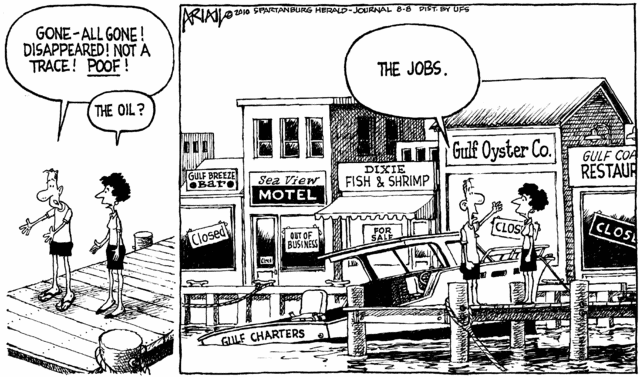
Since the BP oil spill and the announcment of the administration’s moratorium on drilling in the gulf, there has been a lot of talk about the effect of the moratorium on oil production jobs in the gulf area.
But why are oil jobs more important than the jobs portrayed in the cartoon? Why can we just slough off the losses of jobs related to the commercial fishing industries, sport fishing and recreational boating, the tourist business or any of supporting businesses in the gulf and get all out of shape over the oil jobs? Is it because oil jobs pay more? That should be the last measurement when comparing jobs. Is it because the oil industry contributes far more generously to political campaigns or hires more effective lobbyists? This might not be too far from the truth, but isn’t a qualified reason either. Are there MORE oil jobs than these local jobs? I find that unlikely but it still doesn’t make one type of work more important than another.
Aren’t the shrimpers, oystermen, charter owners, innkeepers and restaurateurs just the types of small businesses that the politicians, economists, and pundits adore as the prime generators of jobs? So why are we blowing them off in favor of drill baby drill? If these are viable generational supporting jobs aren’t they at least as important as jobs in the oil industry?
I would like to see a real count on the number of oil jobs that might actually be impacted by the moratorium. I have seen news reports from 97,000 to 300,000. But I suspect those are the total number of jobs in the gulf oil industry and include the current productive wells and their support personnel. These production jobs aren’t going away because of the moratorium. The ones at risk are the transient well drilling jobs. And if you don’t believe they are transient jobs, the threats to move them and in fact some cases where they are supposedly being moved already is proof enough of that fact. But they have always been at risk dependent on the costs of oil exploration. The minute a large oil field is discovered that is cheaper to harvest or when another country decides to lower tariffs or production restrictions, they’re gone. I don’t mean to suggest that these jobs are unimportant or shouldn’t be supported…but the fact that they can move away at any time shouldn’t be dismissed out of hand. And they will just as easily come back as the moratorium ends or the economics of oil production on the world stage changes.
Two quick hits on various job numbers: State tourism officials in Mississippi claim the oil spill may cost the state over 56,000 tourist jobs. And Governor Jindal of Louisiana says the moratorium could cost his state as many as 20,000 jobs.
At this point the oil companies, the states and the federal government have to develop rules and regulations that can be effective in preventing another oil spill. And then develop a functional disaster response plan and a trained recovery team to handle the environmental issues of another spill. The planning should have started already and none of the participants should impede planning and implementation of the necessary changes, but it certainly isn’t unreasonable to impose the moratorium until everything is decided and starting to be put in place.



Recent Comments